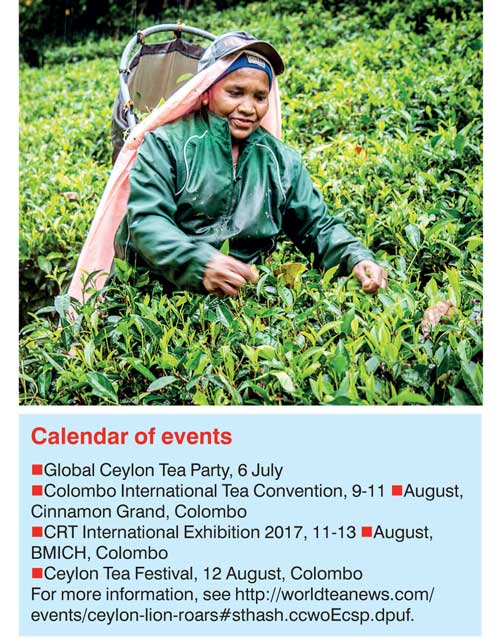Friday Feb 20, 2026
Friday Feb 20, 2026
Thursday, 22 June 2017 00:00 - - {{hitsCtrl.values.hits}}
Sri Lanka’s celebrated Ceylon Tea roared at this year’s World Tea Expo, drawing attention to the official country of origin and showing by example its pedigree of social, economic, and environmental responsibility.
Sri Lanka is the largest exporter of black orthodox tea, accounting for 6.2% of world production and exporting 16.9% of the world’s tea. The island of tea employs 1.5 million people in the cultivation and processing of hand-plucked leaf.
Premala Srikantha, Director of Promotion for the Sri Lanka Tea Board, in the Ministry of Plantation Industries, received a plaque commemorating 150 years of Ceylon Tea from Manik Jayakumar, founder of QTrade Teas & Herbs, in Cerritos, Calif. Jayakumar is a native of Sri Lanka and former manager of several prestigious Sri Lankan tea gardens.
Rohan Pethiyagoda, who chairs the Sri Lanka Tea Board, said the occasion presented not only an opportunity to share with the United States “but the whole of the tea-drinking world”.
The Tea Board announced a Global Ceylon Tea Party to be celebrated 6 July at 5 p.m. at Sri Lankan diplomatic missions worldwide. The event begins in Fiji, then advances by the hour to New Zealand and continues in every time zone.
On the exhibition floor, Chamara Udugama at Tea Talk said the Sri Lanka pavilion provided good exposure to the 3,500 attending. The company offers 40 types of single-estate teas. The fruit teas used in making iced tea are popular, he said, citing papaya peach as an example. “The K-cups are getting notice as well,” said Udugama, whose company, founded in 2013, sells wholesale and operates a tea shop, restaurant, lounge, and hotel in Colombo.
Jayakumar, the event’s Platinum Sponsor, described Sri Lanka’s commitment to sustainability during a presentation at the Special Events Stage. Teas from Sri Lanka are the only teas in the world to earn “ozone-friendly” status under the Montreal Protocol, one of the most successful and effective environmental treaties ever implemented. Many of the gardens there are organic and all greatly limit the use of pesticides, he explained.
Gail Gastelu, publisher of The Tea House Times, presented slides showing the beautiful landscape, modern factories, and people who make up the tea industry in Sri Lanka, with its great diversity of teas from seven distinct producing regions. Her publication is on a mission to help people in the U.S. learn more about Ceylon tea and how special it is, she said.
Srikantha said that Sri Lanka has developed the capability to process tea quickly and to add value in packaging and advanced shipping. The tea auction at Colombo consistently ranks first in pricing teas.
“World Tea Expo is very good,” she said. “I like this show as everybody is serious about tea big or small. They come her to learn. I’m very pleased as we had quite a few visitors.”